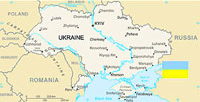Moscow Times: Malaysia Airlines Tragedy Not a Game Changer in Ukraine

(Moscow Times – themoscowtimes.com – Ivan Nechepurenko – July 21, 2014) Despite lofty predictions to the contrary, the downing of Malaysia Airlines MH17 will not change the game in Ukraine, analysts told The Moscow Times on Sunday.
“Rather than pushing for reconciliation and negotiation, the West has used this tr agedy to consolidate against Russia, while Putin remains unable to abandon the insurgents in Donetsk and Luhansk. Contrary to many predictions, this situation only fostered the conflict,” said Vladimir Evseev, director of the Center of Social and Political Sciences.
Mutual Accusations
The Ukraine conflict has been marked by the trend of Russian, Ukrainian, and Western leaders trading barbs and accusations over every unsavory incident. The 298 lives lost in the crash on Thursday propelled all parties to the conflict into yet another blame game.
Western leaders maintained the theory that Moscow retains influence over the rebels, and wasted no time in warning Russia of further isolation depending on how the situation plays out from here.
“The Russians have influence, if not direct control over these people [pro-Russian insurgents],” Britain’s recently appointed Foreign Secretary Philip Hammond told the BBC.
“They have been supplying them, they have been supporting them, they have been providing them with succor. They cannot deny their responsibility for the acts that these people are carrying out.”
The U.S. State Department has claimed that it has evidence that the plane was shot down by a surface-to-air missile from separatist-controlled territory. The people who operated the missile system could have been trained in Russia, it said.
“We are confident that no Ukrainian air defense systems were within range of the crash,” the statement said.
At the same time, the clash has failed to fully consolidate the West against Russia with some leaders taking a much softer stance.
“Russia should commit constructively to various international issues as a responsible state. To help that I will continue dialogue with President Vladimir Putin,” said Japan’s Prime Minister Shinzo Abe.
Meanwhile, Russia had its own idea of who was at fault.
In the immediate after math of the crash, President Vladimir Putin placed blame for the tragedy on the government of Ukraine. “This tragedy would not have occurred if there were peace in the country, or in any case, if hostilities had not resumed in southeast Ukraine.”
Clashes Continue
Against the backdrop of a massive blame game smeared across international headlines and official statements released by leaders around the globe, heavy clashes between pro-Russian insurgents and the Ukrainian army persisted over the weekend.
The OSCE released a report on Saturday claiming that at least 250 civilians have been killed and more than 850 wounded as a result of fighting in the city of Luhansk alone between June and July. These statistics exclude civilians killed within formally recognized combat zones and casualties among combatants, the organization said.
“The Ukrainian army calculated that the insurgents would refrain from using anti-aircraft weapons after the M alaysian airliner was downed. In addition, the Ukrainian army anticipated that Russia would cease [allegedly] providing weapons across the border amid the increased international attention, which could invite further international condemnation,” said Mikhail Remizov, president of the Institute of National Strategy.
“The political pressure being applied against Moscow testifies that the tragedy is used in the political struggle over Ukraine. It seems that the West is not interested in reconciliation,” he said in a phone interview.
According to Remizov, Moscow cannot abandon the insurgency in eastern Ukraine, whether or not the rebels in fact downed the plane, as it is afraid that the stability in Crimea would be threatened then.
“Even if Ukraine’s east will be completely purged of insurgency, the political struggle between Russia and the West will continue,” he said.
Putin Cautions
As with other instances of large-scale tragedies that involved loss of lives among civilians, Putin has avoided making any big moves, rather waiting for the dust to settle, Evseev said.
“Putin realizes that the West is trying to provoke him now and will wait until the situation and reaction to it will be more clear to make a move,” said Evseev.
“We see now that even after such tragedy we have not reached the bottom of this crisis. A turning point is possible, but the West wants to continue the old game,” he said.
